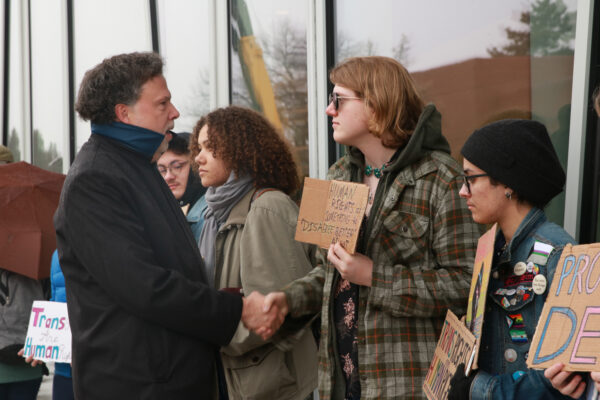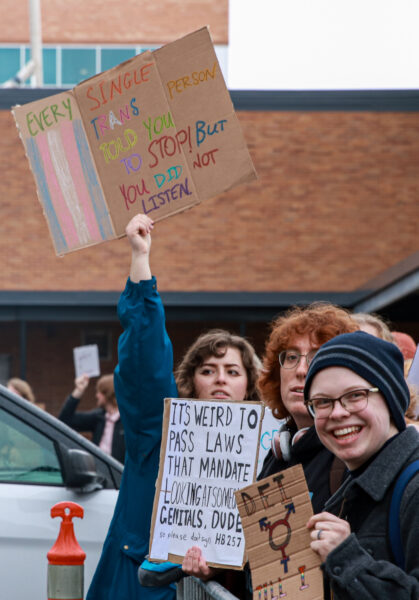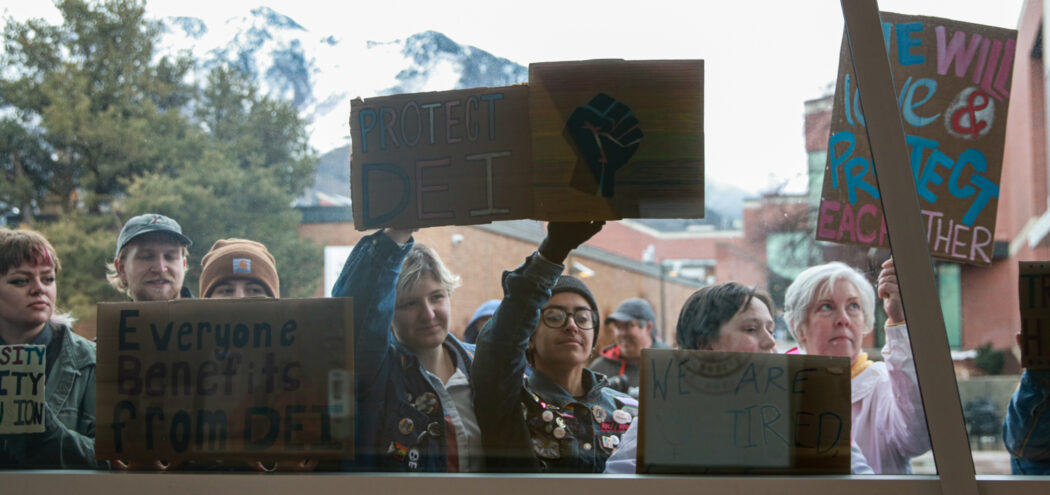Gov. Cox speaks on conflict as the USU community protests outside
Outside the Russell/Wanlass Performance Hall on Monday afternoon, protesters holding signs gathered under the hanging roof of the building to stay out of the rain.
Inside, the President’s Forum on Conflict and Conflict Resolution, hosted by Utah State University President Elizabeth Cantwell, was featuring a discussion between Gov. Spencer Cox and visiting professor and author Irshad Manji.
The peaceful protest was held in response to two bills recently signed by Cox after they passed the Utah House and Senate: HB261, “Equal Opportunities Initiative,” and HB257, “Sex-Based Designation For Privacy, Anti-Bullying, and Women’s Opportunities.”
Both have been controversial in Utah politics.
“Maintaining the peace,” protester Clara Durling said. “We don’t want to disrupt anything. That’s been a very clear part of our planning is not to disrupt the speech.”
The overall sentiment was of unity and community.
“We really want this to be like peaceful and silent that we’re like also here in consolidation with the community,” protest organizer Kris Carpenter said.
HB257, nicknamed the Bathroom Bill, states that males and females must use corresponding sex-designated restrooms, with the exception that people who do not identify as either may request special accommodations based on gender identity.
Durling said they plan on taking testosterone in the future to transition into a male. Right now, they use the women’s restroom because they look more feminine.
“So, it’s not just simple to go into one restroom,” they said.
Protesters were mostly silent throughout the event. Many had the same sentiment surrounding the bills, stating that they cannot legally use a restroom on campus anymore.
“We just want our voices to be heard about the recent bills that he signed,” said protest leader Samson Calderondiltz. “I basically cannot comfortably use a bathroom legally on campus.”

Dean of CHaSs, Joseph Ward, shakes hands with protestors outside of Russell Wanlass before heading in to watch the presentation.
The bill states students in a public school setting may ask for accommodations on the basis of gender identity. The school then must provide a single-occupant bathroom, unisex bathroom, reasonable access to a faculty or staff restroom, or a staggered schedule that provides temporary access.
“I think that the bathroom bill specifically is going to make it really uncomfortable and anxiety-inducing for a lot of students who just want to use the bathroom,” said protester Bethany Haskell.
Protester Alex Blanche said they attended to show Cox who is impacted by the bills.
“We also just want to make our voices heard,” Blanche said.
Blanche said the definitions used in the bill are specific.
“You need a birth certificate and bottom surgery to be able to use any gendered facilities including bathrooms, locker rooms, showers,” they said.
The bill does require these qualifications — an unamended birth certificate or documentation of a medical procedure — to be met before a person can use a sex-designated restroom.
Kris Carpenter, organizer of the protest, said the bill “requires each new building to have a unisex restroom.”
Along with this, the bill says existing government buildings must renovate to provide a unisex bathroom.
“It’s also to send a clear message that we are not OK with this. It’s to communicate with Governor Cox that we’re really frustrated,” Carpenter said.
HB261 requires government institutions to perform surveys on the employers and employees on the overall climate of the institution. Beginning on July 1, 2025, the committee will hold biennial reviews on institution’s compliance with the bill.
“It’s going to prevent the USU office of Diversity, Equity and Inclusion from keeping its name. It’s going to be the office of Student Success Center,” Carpenter said.
The bill also prohibits submissions that include a submission, statement, or document that requires an individual to articulate the individual’s position, view, contribution, effort, or experience regarding a policy, program, or initiative that promotes differential treatment based on an individual’s personal identity characteristics.
“And so, there’s something that’s so terrifying about that. That like people are directly targeting less than 1% of the population,” Carpenter said.
Inside, Governor Cox said, “We’ve forgotten how to disagree without hating each other, and you can’t solve problems without healthy conflict.”
This comes after him talking about the National Governor’s Association chair initiative, “disagree better.”
“This divisiveness is happening and so much of it centers around the college campus experience,” he said.
As a former Aggie, he goes on to say that colleges are the place where students come to seek knowledge and truth. It is also a place where bright people come together to engage with one another to find truth and knowledge.
“This place is responsible for making me who I am today,” he said.

Protestors gather outside of Russell Wanlass performance hall this afternoon.
Professor Irshad Manji, the guest speaker, had similar sentiments to Governor Cox.
“The moment an issue becomes polarized then the conversation, such as it, stops being about that issue, and starts being about saving face,” she said.
Manji said that most of the time when in a polarizing conversation, it is the ideas that stop people from engaging.
“We often get in the way of our own ability to be understood and heard,” she said.
Manji approaches life with an intention to be curious.
“Curiosity is something we all have as human beings, whether we are permitting ourselves to express it is another question,” she said.
The protest outside seemed to reflect the ideals of what was happening on the inside.
Carpenter said the purpose of the protest was “to offer hope” and to send a message.
“I know so many Utah State students and faculty and professors and employees are so welcoming and so kind and they really do want to create a better environment,” Carpenter said.

